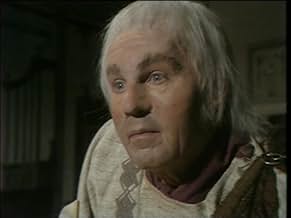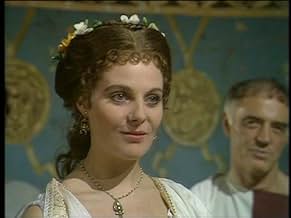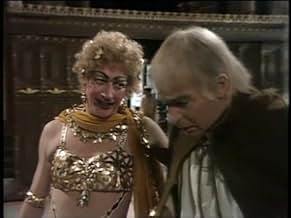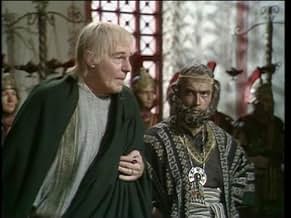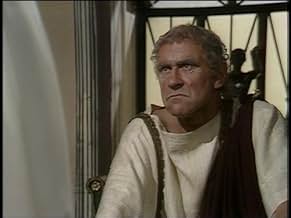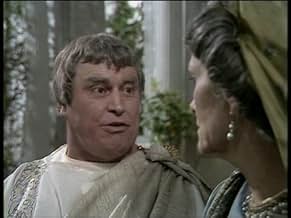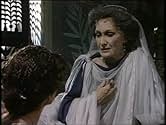Adicionar um enredo no seu idiomaThe personal and governmental affairs of the Julio-Claudian dynasty at the beginning of the Roman Empire, as recalled by one of its rulers.The personal and governmental affairs of the Julio-Claudian dynasty at the beginning of the Roman Empire, as recalled by one of its rulers.The personal and governmental affairs of the Julio-Claudian dynasty at the beginning of the Roman Empire, as recalled by one of its rulers.
- Ganhou 1 Primetime Emmy
- 7 vitórias e 5 indicações no total
Explorar episódios
Enredo
Você sabia?
- CuriosidadesJohn Hurt revealed that he declined the role of Caligula when it was first offered to him. Because of the time-span of the production, the fact that Derek Jacobi was the only cast member to appear in every episode and the subsequent commitments of the other cast members, Herbert Wise decided to throw a special pre-production party so the entire cast and crew could meet. Wise invited Hurt to the party hoping he would reconsider. When Hurt met the cast and crew, he was so impressed that he immediately took the part.
- Erros de gravaçãoIn the Senate chamber, the famous statue of Romulus and Remus being suckled by a she-wolf is above the door. But the two children were added to the statue in the 15th century.
- Versões alternativasThe show aired in 13 episodes on PBS in 1977, but was originally shown in 12 episodes in England, the first and second episodes having been combined. This is the version now available in the remastered edition on DVD.
- ConexõesFeatured in The 30th Annual Primetime Emmy Awards (1978)
Avaliação em destaque
In writing his epic novels `I, Claudius' and `Claudius the God', from which this series is adapted, Robert Graves reinvented the genre of historical fiction. And he could hardly have chosen a more fascinating subject than the Julio-Claudian dynasty. Even a tame retelling, based strictly on verified historical fact, would have made an interesting tale. But by embracing the lurid, sensationalistic hyperbole heaped upon the founders of the Roman Empire by later writers (Suetonius and Tacitus in particular), Graves concocted the ultimate in dysfunctional families, weaving a tale of scandal and debauchery capable of shocking even the most jaded of modern audiences. The more eminent classicists, naturally, sneered, as eminent classicists tend to do toward anything that threatens to make the ancient world more accessible to `hoi polloi'. One is forced to admit that, as history, Graves' juicy narrative is bunk. But o ye gods, what enjoyable bunk it is!
The drama gives an insider's view of the Julio-Claudian Dynasty, the first emperors of Rome. Over the course of his long reign, Augustus has managed to bring peace to his nation after nearly a century of off-and-on civil wars. But he remains a man divided, hoping for the eventual return of the old Republican government, but knowing that the best hope for a lasting peace is the continued concentration of power in a single person. Augustus therefore sets himself to the task of grooming a successor, one who shares his dream and will continue laying the foundations for the restoration of the Republic. His wife, however, Livia Drusilla, is determined to thwart his plans, and embarks on a slow, murderous scheme to place her own son (whom she fancies she can control) on the throne. The tale is told through the eyes of Claudius, step-grandson to Augustus, who suffered from the crippling effects of a childhood illness and was thus despised and ignored by much of his own family. Regarded as an idiot and of no threat to anyone, he alone remains standing while the poison flows and the daggers flash. To the surprise of all (none the least himself) this drooling, stuttering, limping old fool turns out not to be such a fool after all, and in one of history's great ironies, wins the prize everyone but he is after: absolute power.
Again, the historical facts alone make this an interesting tale. But it is the tantalizing glimpse into the inner workings of the world's first `First Family' that makes `I, Claudius' so much fun. Bill Clinton's philandering and the endless public spectacle that is the British Royals just seem so incredibly dull and tame compared with the bad behavior of Augustus' clan. Matricide, patricide, fratricide, regicide, suicide, incest, rape, pedophilia.and that's on a slow day. Poisonings, stabbings, betrayals, double-crosses, triple-crosses, madness. And one gentle soul sitting in the corner watching it all. Robert Graves' story brings out the tremendous irony of a nation finally at peace with itself, but ruled by a family embroiled in its very own civil war. It's the sort of sordid tale one finds only in the most disreputable of tabloids, but then rendered in gorgeous prose and delivered by the finest actors. To the uninitiated, it might best be described as a guilty pleasure cleverly masquerading as a stuffy British period drama.
I don't think anyone could have hoped for a more faithful transition from book to film than what the BBC achieved. Working with a 12+ hour running time, screenwriter Jack Pulman was not forced to content himself with a `Cliff's Notes' version of the story. Events progress in a naturally expansive manner, and characters grow and mature (or fail to do so) believably over time. In recreating the novels for the stage (after all, let's face it - this is predominantly a televised stage play) Pulman was constrained only by a modest budget and the limitations of the television studio. Action is confined to indoor sets, and the more spectacular aspects of daily life in ancient Rome (attending the Circus Maximus, for example) are left to the viewer's imagination, hinted at by the sounds of roaring crowds but never actually seen. For those audience members not put off by such, or by the drab color and lighting usually reserved for daytime soap operas, the entire production is a treat from beginning to end.
The acting is superb at every turn. Derek Jacobi lends tremendous dignity to his portrayal of Claudius, whose physical handicaps might have come off as insulting or hammy from a lesser actor. He is utterly believable as the `wise' fool, the only person in the entire family NOT scheming for power, and therefore the only one worthy of it. As Livia, Siân Phillips is a study in controlled, cunning evil. The role is reminiscent of Eleanor of Aquitaine in `The Lion in Winter', except that even Katherine Hepburn's Oscar-wining performance in that film is utterly outdone here (ironically, Siân Phillips also played the role of Queen Eleanor, in the BBC's adaptation of `Ivanhoe'). John Hurt's gleefully decadent turn as Caligula is fascinating to watch. Hurt's eyes, throughout his portrayal, remain chillingly cold and lifeless even as he smiles and laughs - except of course, for his expression of shock upon realizing that his sister Drusilla is, in fact, mortal. The most impressive moment in the entire production, however, came from Brian Blessed (Augustus), whose slow, quiet, passing away remains the most convincing screen death I have ever witnessed.
There are simply not enough superlatives in the English language to express my opinion of the towering triumph that is `I, Claudius'. And seeing the 9.5 user rating here on the IMDB, apparently I'm not alone.
The drama gives an insider's view of the Julio-Claudian Dynasty, the first emperors of Rome. Over the course of his long reign, Augustus has managed to bring peace to his nation after nearly a century of off-and-on civil wars. But he remains a man divided, hoping for the eventual return of the old Republican government, but knowing that the best hope for a lasting peace is the continued concentration of power in a single person. Augustus therefore sets himself to the task of grooming a successor, one who shares his dream and will continue laying the foundations for the restoration of the Republic. His wife, however, Livia Drusilla, is determined to thwart his plans, and embarks on a slow, murderous scheme to place her own son (whom she fancies she can control) on the throne. The tale is told through the eyes of Claudius, step-grandson to Augustus, who suffered from the crippling effects of a childhood illness and was thus despised and ignored by much of his own family. Regarded as an idiot and of no threat to anyone, he alone remains standing while the poison flows and the daggers flash. To the surprise of all (none the least himself) this drooling, stuttering, limping old fool turns out not to be such a fool after all, and in one of history's great ironies, wins the prize everyone but he is after: absolute power.
Again, the historical facts alone make this an interesting tale. But it is the tantalizing glimpse into the inner workings of the world's first `First Family' that makes `I, Claudius' so much fun. Bill Clinton's philandering and the endless public spectacle that is the British Royals just seem so incredibly dull and tame compared with the bad behavior of Augustus' clan. Matricide, patricide, fratricide, regicide, suicide, incest, rape, pedophilia.and that's on a slow day. Poisonings, stabbings, betrayals, double-crosses, triple-crosses, madness. And one gentle soul sitting in the corner watching it all. Robert Graves' story brings out the tremendous irony of a nation finally at peace with itself, but ruled by a family embroiled in its very own civil war. It's the sort of sordid tale one finds only in the most disreputable of tabloids, but then rendered in gorgeous prose and delivered by the finest actors. To the uninitiated, it might best be described as a guilty pleasure cleverly masquerading as a stuffy British period drama.
I don't think anyone could have hoped for a more faithful transition from book to film than what the BBC achieved. Working with a 12+ hour running time, screenwriter Jack Pulman was not forced to content himself with a `Cliff's Notes' version of the story. Events progress in a naturally expansive manner, and characters grow and mature (or fail to do so) believably over time. In recreating the novels for the stage (after all, let's face it - this is predominantly a televised stage play) Pulman was constrained only by a modest budget and the limitations of the television studio. Action is confined to indoor sets, and the more spectacular aspects of daily life in ancient Rome (attending the Circus Maximus, for example) are left to the viewer's imagination, hinted at by the sounds of roaring crowds but never actually seen. For those audience members not put off by such, or by the drab color and lighting usually reserved for daytime soap operas, the entire production is a treat from beginning to end.
The acting is superb at every turn. Derek Jacobi lends tremendous dignity to his portrayal of Claudius, whose physical handicaps might have come off as insulting or hammy from a lesser actor. He is utterly believable as the `wise' fool, the only person in the entire family NOT scheming for power, and therefore the only one worthy of it. As Livia, Siân Phillips is a study in controlled, cunning evil. The role is reminiscent of Eleanor of Aquitaine in `The Lion in Winter', except that even Katherine Hepburn's Oscar-wining performance in that film is utterly outdone here (ironically, Siân Phillips also played the role of Queen Eleanor, in the BBC's adaptation of `Ivanhoe'). John Hurt's gleefully decadent turn as Caligula is fascinating to watch. Hurt's eyes, throughout his portrayal, remain chillingly cold and lifeless even as he smiles and laughs - except of course, for his expression of shock upon realizing that his sister Drusilla is, in fact, mortal. The most impressive moment in the entire production, however, came from Brian Blessed (Augustus), whose slow, quiet, passing away remains the most convincing screen death I have ever witnessed.
There are simply not enough superlatives in the English language to express my opinion of the towering triumph that is `I, Claudius'. And seeing the 9.5 user rating here on the IMDB, apparently I'm not alone.
- ZDiogenes
- 3 de ago. de 2003
- Link permanente
Principais escolhas
Faça login para avaliar e ver a lista de recomendações personalizadas
Detalhes
Contribua para esta página
Sugerir uma alteração ou adicionar conteúdo ausente

Principal brecha
What is the Brazilian Portuguese language plot outline for Eu, Cláudio (1976)?
Responda


